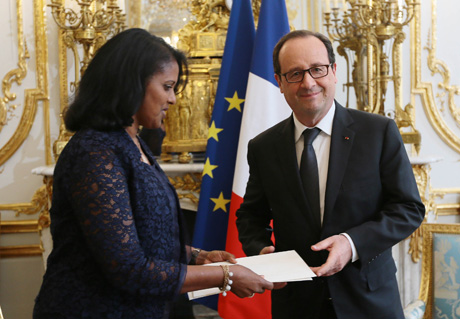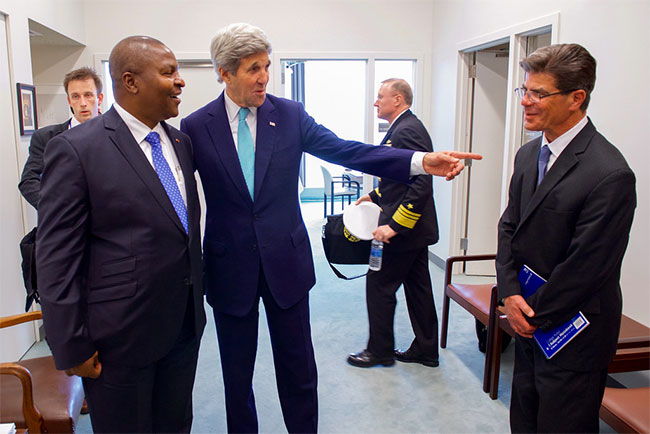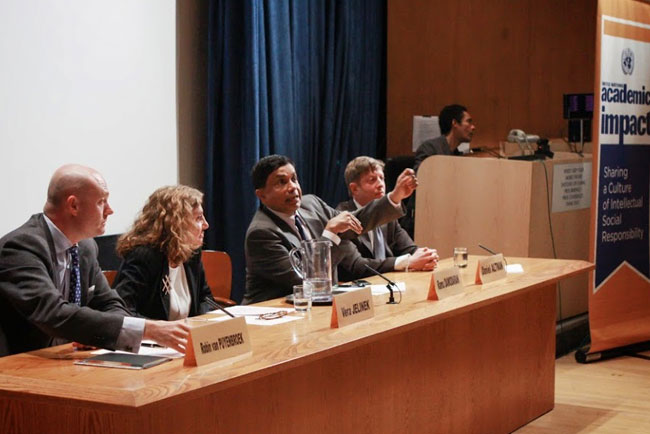EUCLID, an international intergovernmental institution with a university mandate, offers to select students from the general public a highly specialized online master in terrorism studies and deradicalization (MTSD). This flex-time program presents a balanced, comprehensive and practical study of this multifaceted problem with the aim to prepare outstanding professionals and civil servants ready to work in a variety of settings including:
- international organizations
- non-governmental organizations
- local governments including schools
- regional and national governments
- law enforcement bodies including Interpol and Europol.
EUCLID’s online master in terrorism studies and deradicalization is unique in that it is offered by an intergovernmental treaty-based organization with a university mandate.
EUCLID has a specialized expertise in global affairs, including interfaith studies. EUCLID is a partner of several organizations that are relevant to this program, notably the World Mediation Organization (Berlin) and two affiliated institutions of the Organization of Islamic Cooperation (IsDB, ICCIA).
This new program addresses a tremendous global need for truly qualified professionals able to serve at all levels of government and civil society as experts in the field of what is generally referred to as Islamic radicalization leading to the clear and present threat of violent extremism or even terrorist actions.
EUCLID’s approach to delivering the highest possible level of competency in terrorism studies as well as deradicalization solutions is both multilevel and multidisciplinary.
- Multilevel means that MTSD graduates will be able to function at various levels, global, national, local (city), communal and inter-personal.
- Multidisciplinary means that the program brings together knowledge from various areas of competence, including psychology, sociology and religious studies.
EUCLID is uniquely qualified in terms of educational philosophy because it does view this field of study from US-centric or Euro-centric perspectives. It frankly tackles the issue of Islamophobia as well as realism, ” laïcité” and cultural imperialism in order to form well-informed and balanced experts who may come from a variety of national and religious backgrounds..

Photo: EUCLID graduate Ambassador Hanna Simon presenting her letters of credence to President Francois Hollande of France.

The current (responsive and mobile-friendly) page recommended to obtain full and updated MTSD program information can be found at:
http://m.euclid.int/online-master-in-terrorism/

Academic Presentation:
Radicalization and terrorism are foremost threats globally, not only in Western Europe but also in Muslim-majority countries such as Iraq and Jordan. Although the percentage of Muslims that are radicalized in the sense of being willing to engage in terrorist acts is extremely small, the fact that there are more that one billion Muslims in the world today, many living in very adverse circumstances, has led to tragic events associated with the phenomenon known as Islamic radicalization.
This program aims precisely at training highly knowledgeable and competent experts who will be able to meet the tremendous demand for professionals at all level of society, academia and government. It is important to note that this programs covers not only violent Islamic radicalization but also other forms of terrorism and radicalization, including but not limited to far-left, far-right, neo-nazi, islamophobic, national Hindu, Christianity-inspired, State sponsored and eco-terrorism.
Note: This degree program is distance-based only and requires fluency in the English language.

Program Brochure and video:

Admission Requirements:
Applicants must have a Bachelor’s degree or its international equivalent, issued by an institution listed in the latest edition of the UNESCO-IAU handbook or a similar official directory.
Government-sponsored applicants (who are already government staff) may be admitted without a Bachelor’s degree if their level of education and experience is deemed sufficient. EUCLID may require these participants to complete bridge courses prior to enrolling in the program.
Fluency in English (spoken and written) is required and will be tested.
Students are expected to be in position to dedicate 10 to 15 effective hours of study on a weekly basis.

Curriculum / Program Courses:
EUCLID Online Master in Terrorism Studies and Deradicalization courses (from EUCLID database):
PRIMARY ASSOCIATED COURSES |
| Code |
Course Name
|
|
| -ACA-401 |
International Academic and Professional Paper Writing |
3 |
| -TPH-499 |
Argumentation and Critical Thinking |
2 |
| -TS-300 |
Background Studies: US and the Middle East |
2 |
| -TS-400 |
Terrorism: an enduring and complex issue |
3 |
| -ISL-700 |
Studies in Modern Islamic Radicalization |
4 |
| -ISL-600 |
Studies in Islamophobia |
3 |
| -TS-500 |
Studies in Counter Terrorism |
4 |
| -TS-700 |
Studies in Deradicalization |
4 |
| -DIP-606 |
Master's Capstone Paper or Thesis |
10 |
| |
Total Credit Hours (US): |
35 |
Elective Courses:
STANDARD DEGREE ROADMAP - SUGGESTED ELECTIVES |
|
Course Name |
|
|
Overview of Islam, Islamic Law (Shar'iah) and the Islamic World |
4 |
|
Advanced Studies in Inter-Religious Dialogue 1 |
3 |

For more information:
Faculty Profiles
Institutional Recognition / Accreditation
About EUCLID: Institutional Background
Register Now

EUCLID: International Relations in Practice:

Photo above: EUCLID's High Steward Pr Faustin Touadéra with US Secretary of State John Kerry. Full caption: "U.S. Secretary of State John Kerry, who speaks fluent French, points to his French interpreter on standby as he meets with CAR President Faustin-Archange Touadéra after both officials signed the COP21 Climate Change Agreement on Earth Day, April 22, 2016, at the United Nations Headquarters in New York, N.Y. [State Department photo/ Public Domain] [State Department photo/ Public Domain]"

Photo above: EUCLID's Robin van Puyenbroeck, panel speaker at the Eurozone in Crisis event at the United Nations Dag Hammarskjöld Auditorium, May 2013. |